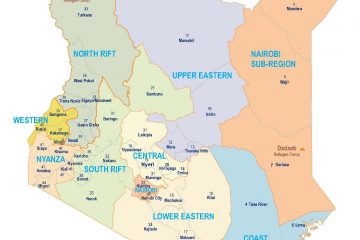CP – Operating Context
August 9, 2019
2.0 OVERVIEW OF THE OPERATING CONTEXT
During the county, regional and national level consultations during the development of this Corporate Plan, the Political, Economic, Social, Technological, Environmental and Legal (PESTEL) contexts were reviewed.
It emerged that the Corporate Plan was developed one year after the tumultuous August 2017 General Elections. The elections were preceded by five years of active politicking by different coalitions, which negatively affected governance and national cohesion. Meaningful development took a backseat. The ethnicity oriented campaigns prior to the elections left the country deeply polarized. However, the key event that is likely to influence the political environment during this Corporate Plan period is the meeting between President Uhuru Kenyatta and his erstwhile opponent, opposition leader Rt. Hon Raila Odinga, on 9th March 2018, which is commonly referred to as “The Handshake”. During that meeting, they established the “Building Bridges to Unity A New Kenya Nation”. This action diffused the tensions and virtually brought the 2017 General Elections to a closure. Nonetheless, the Corporate Plan period will be characterized by early campaigns for positions during the 2022 General Elections.
Also impacting the political environment are the National Population and Housing Census to be carried out in August 2019, and the review of electoral units boundaries the year after. It is expected that political actors will seek to influence these processes to their selfish benefits.
The Council and like-minded agencies will thus need to continue pushing for national dialogue as a means of resolving the underlying causes of political conflicts in the country. Not only will national dialogue promote national cohesion, but it will also ensure that future elections are not a reason for breakdown of the country. Strengthening devolution will also be hallmark of the Corporate Plan period.
At the governance level, this Corporate Plan was developed at a time when public participation in decision making was dwindling as the expected benefits of devolution proved hard to come by for Kenyans. By July 2018, 30 out of 47 County Governors were under investigation on corruption related cases, which gave credence to the notion that Kenya merely achieved a devolution of corruption, not service delivery. The suspected corruption was coupled with financial challenges at the Counties due to poor accounting of locally generated income, while the national government delayed disbursement of tax revenue to the Counties. During the 7th Corporate Plan period, the Council and other agencies will continue to build capacities of Kenyans to participate in governance and decision making processes so that they reap the benefits of the Constitution of Kenya 2010.
Economically, the impact of the pre and post elections tensions was most manifested in the national economy, where the growth of the Gross Domestic Product (GDP) slumped from 5.1% in 2016 to 4.9% in 2017, and dropped even lower in the early part of 2018. However, the economic outlook changed after The Handshake, with the World Bank projecting an improvement to 5.8% growth in 2019 – 2020 period.
The anticipated growth however does not mask the fact that most Kenyans suffer from abject poverty, with most living on less than US$ 2 per day, and exhibiting very low purchasing power as shown by a Gross National Income of US$ 1,200 (compared to US$ 15,410 of Seychelles, the highest ranking African country). Further, Kenyans have a high dependency ratio of 77:100, which means that individuals with an income are grossly fewer than those without.
Unemployment is rampant, and at the time of development of this plan, firms and companies were shutting operations in the country. The trend was attributed to increased taxation, high cost of doing business and rampant corruption. This resulted from a situation where, despite constant pledges by the President that eradication of corruption would characterize his second term, revelations of mega scandals remained rampant. Anti-corruption campaigns are expected to be a core feature of the 7th Corporate Plan period, coupled with advocacy for viable and pro-poor economic policies. Key among these will be identifying and advocating for measures to manage the public debt, which rose from KShs 1.8 trillion in 2013 to KShs 5.04 trillion in June 2018. The Debt to GDP ratio, which measures the country’s ability to service the loans, stood at 57.1% in 2018, and expected to grow to 65% by 2020.
Another sector that will require keen attention during the Corporate Plan period is food security, noting that the country continues to be at risk due to over reliance on rain-fed agriculture. Unpredictable weather patterns due to Climate Change, coupled with high cost of farm inputs and weak pest control measures continue to impact heavily on farmers. Worse still are the weak post harvest handling practices and capacities, which affect not only individual farmers but also the national government. This came to fore when reports emerged in late 2018 that more than 60% of the maize held in the national food reserves was unfit for human consumption. The Council and other actors will, during the 7th Corporate Plan period, need to enhance food security interventions across the country.
At the social level, the population of Kenya was estimated to be 50.9 million in July 2018, and projected to grow to 55 million by the end of the Corporate Plan period. The population is nonetheless youth-heavy, with those aged 0 – 34 years totaling 70%. This cohort requires special attention.
Also notable is the rapid breakdown of social structures, leading to a massive increase in the number of single headed families. Further, gender justice is still a far cry, with women facing barriers in economic and political participation.
Technologically, the country has made significant strides and is a global leader in mobile money transfers. The country has become an innovation hub especially for mobile telephony based financial services. The innovation is set to expand to other areas, and will impact on the work of the Council during the Corporate Plan period.
A major element that will have ramifications on the nation during the Corporate Plan period is Climate Change, which has been exacerbated by environmental degradation and uncontrolled exploitation of natural resources. Advocacy for implementation of the legal framework on climate change will take center stage during the period, coupled with capacity building of communities to improve their skills in adaptation and mitigation. With regard to the extractives sector, advocacy is required to ensure that pro-people policies and legal frameworks are put in place. This is in addition to capacity building community members so that they seek the most benefit from the sector.
At the Legal level, this Corporate Plan was developed when agitation for review of the Constitution of Kenya 2010 was gaining traction. This provoked intensive political discussions on whether a referendum is required or not, and this is likely to be point of division in the country. Other than the Constitution, attention is required on various laws that need to be developed and those that require amendment to safeguard the rights of Kenyans.
Internally, the Council over the 6th Corporate Plan period continued growing her organizational capacity to achieve her vision and mission. Programme work was effectively implemented, and investments were made to enhance the local resource mobilization capacity. A notable event was the re-election of Rev Canon Rosemary Mbogo as Chairperson of the Council during the 62nd General Assembly. She was the first female chairperson since the Council was founded more than 100 years ago, and her election was a major statement regarding the gender justice move within the Council.




